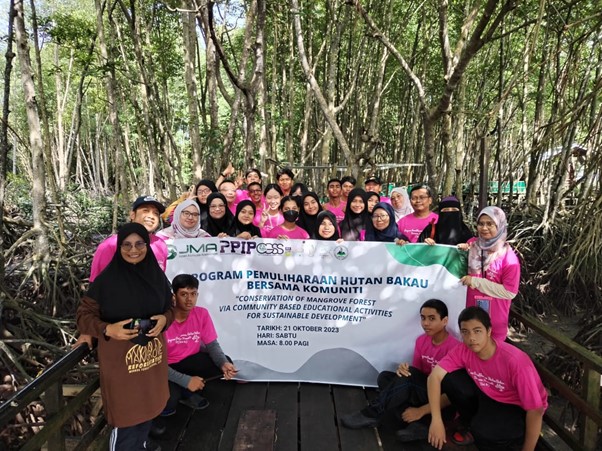KUALA MUDA: Universiti Sains Malaysia (USM), together with partners from various organisations successfully organised a mangrove planting project recently in Kedah.
Held in Kuala Muda, Kedah, the initiative which was funded by Japan Malaysia Association (JMA) through the USM School of Educational Studies (PPIP), also received support from the Regional Centre of Expertise (RCE Penang@USM), Kedah Forest Department, and Kelab Pendidikan dan Kebajikan Puncak.
30 students, teachers, and USM staff were guided by Kelab Pendidikan dan Kebajikan Puncak and the Kedah Forest Department, to plant mangrove saplings in the designated areas. Participants from SM Al-Itqan, SM Teknik Tunku Abdul Rahman Putra, SM Sains Tun Syed Sheh Shahabudin, SMK Permatang Tok Jaya, and SMK Convent Butterworth were instrumental in guaranteeing the success of the mangrove plantation.
USM took steps to preserve the mangroves along the coastal areas of Kuala Muda as means to combat coastal degradation but also fostered an understanding of the vital role mangroves play in the ecosystem among the participating students and teachers.
As a part of the project, USM also organised a briefing session to educate the students and attendees about the crucial role of mangrove forests in maintaining ecological balance. Mangroves act as a buffer against coastal erosion, provide habitat for various marine species, and sequester large amounts of carbon dioxide. Their preservation is essential for the well-being of both local communities and the broader environment.
“This project aligns perfectly with our commitment to environmental sustainability and educational development,” said Associate Prof Dr Rabiatul-Adawiyah Ahmad Rashid, the Head of the project from PPIP.
The recent mangrove planting initiative in Kuala Muda represents the fourth instalment in a highly successful series of projects. Building upon the achievements of the preceding Series 1, 2, and 3 initiatives, this ongoing effort continues to make a lasting impact on the local ecosystem and the broader environment.
This project at the same time aligns with the SDG Goal 15 – Life On Land and SDG 14 – Life Below Water. By planting mangroves, USM is contributing to the conservation and sustainable use of terrestrial ecosystems, which directly links to the preservation of biodiversity and the promotion of sustainable land management practices, while helping to protect marine life and promote the sustainable use of oceans and seas. This project is a testament to the importance of protecting the world’s marine and coastal environments.
As the saplings take root and grow, they will not only help protect the local coastline from erosion but also contribute to a cleaner atmosphere by capturing carbon dioxide. This USM-led endeavour exemplifies the power of education, collaboration, and environmental stewardship, serving as a beacon of hope for a more sustainable future.
The involvement of RCE Penang, a recognised leader in sustainable education and community engagement, further emphasizes the importance of this initiative, by connecting the university with various stakeholders and facilitating the smooth execution of the mangrove planting project. “It’s a win-win situation; not only we are contributing to the preservation of our natural surroundings, but we’re also instilling in our students a deep sense of responsibility toward the environment,” said Associate Professor Dr. Japareng Lalung, the coordinator of RCE Penang, Centre for Global Sustainability Studies (CGSS), USM.
“By having this initiative, we come one step closer to achieving the United Nations’ Sustainable Development Goals, collectively working towards a more harmonious and balanced coexistence between humanity and the natural world”, said Wan Sharipahmira Mohd Zain, a personnel from the Centre for Global Sustainability Studies, USM.
The collaboration between USM, RCE Penang, the Kedah Forest Department, Kelab Pendidikan dan Kebajikan Puncak, and the Japan Malaysia Association showcases the potential for international cooperation in addressing global environmental challenges. The project at Kuala Muda serves as a model of how organisations and institutions at various levels can come together to work towards achieving the United Nations Sustainable Development Goals (SDGs).











